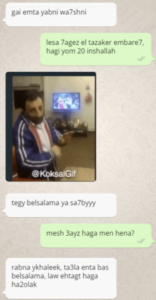Today we are back with Egyptian Arabic Conversation 17.
In each Conversations post, we will provide you with:
- a screenshot from an actual conversation between two Egyptians
- the translation of each line of text, including English, Franco and Arabic script
- context on the conversation and further explanation
We think learning Egyptian Arabic from actual, authentic conversations between Egyptians is both fun and effective. We hope you like it too!
Egyptian Arabic Conversation 17: Arrive Safe
As always, we will start out with a screenshot of a WhatsApp conversation in Egyptian Arabic.
(Sorry if it’s blurry!)

The conversation is in Franco, but we put the actual Arabic below.
Before getting started with this Conversations post, be sure to check out our post on writing in Franco Arabic.
Egyptian Arabic Conversation 17: Translation
One note before we get started – this is a conversation between two men.
Pay attention to the verb conjugations.
When are you coming back (son), I miss you. : gai emta yabni wa7shni.
.جي امتى يابني واحشني
I just booked my tickets yesterday, I will arrive on the 20th God-willing. : lese 7agez el tazaker embare7, hagi yom 20 inshallah.
.لسه حاجز التذاكر امبارح، هاجي يوم 20 ان شاء الله
Arrive safe my friend (and a celebrating GIF). : tegy belsalama ya sa7byyy.
.تيجي بالسلامة يا صاحبي
Do you want anything from here? : mesh 3ayz haga men hena?
مش عايز اي حاجة من هنا؟
God bless you, I just want you to arrive safely, if I needed anything I will tell you. : rabna ykhaleek, ta3la enta bas belsalama, law ehtagt haga ha2olak.
.ربنا يخليك، تعالى انت بس بالسلامة، لو احتجت حاجة هقولك
Egyptian Arabic Conversation 17: Important Vocabulary
Son. : yabni.
.يابني
This is a common Egyptian Arabic nickname. It’s usually not literally a father talking to his son, but just friends speaking to each other in an endearing way.
I miss you. : wa7shni.
.واحشني
A common thing to say. Note, this is what you would say to a man.
Saying it to a woman would be wa7shini / واحشيني.
I just… : lese…
…لسه
In Egyptian Arabic, lese technically means “still.” Used along with a verb conjugated in the past tense (as it is here), it means “I just…”.
I will arrive… : hagi…
…هاجي
This is a good example of speaking in the Egyptian Arabic future tense.
God-willing. : inshallah.
.ان شاء الله
The phrase Inshallah is one of the most important things you can know in Egyptian Arabic.
Arrive safe. : tegy belsalama.
.تيجي بالسلامة
This is a common thing to say to somebody when they are traveling. It’s basically telling them “safe journey.”
God bless you. : rabna ykhaleek.
.ربنا يخليك
Context + Further Explanation
Egyptians love memes.
As you see above , there is one included in this conversation. Here’s a recommendation from us: try to learn what some of these “most common Egyptian memes” are.
This not only makes your conversation via WhatsApp more natural, but gives you an insight into Egyptian culture.
An added bonus is that you will surely impress the Egyptians in your life.
Check out this list to get started.
…
Happy learning,
Cleo Lingo

